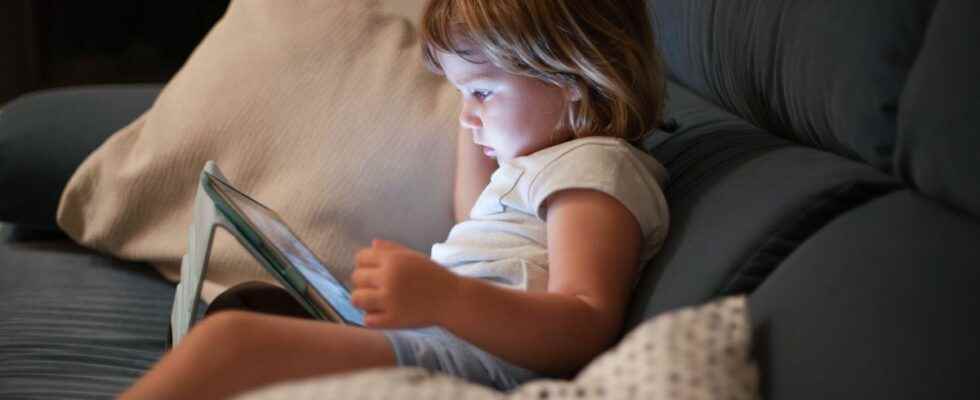Published on
Updated
Reading 4 mins.
According to a study published Monday, December 12, the simple fact of giving a screen to a young child in order to avoid a crisis would have a paradoxical effect: by distracting him at the time, the screen would ultimately hinder his ability to regulate his own long-term emotions. A practice to avoid.
Young parents, this situation may be familiar to you: it’s late, you’re alone with your toddler, at home or in a public place, and he’s ready to throw a tantrum in the face of frustration or simply because of fatigue. A situation that can also strain you as a parent. Sometimes you give in… A few minutes in front of a screen (that of your smartphone or the television) will allow you all to find calm, in a few minutes. An effective technique, certainly, but nevertheless bad for the development of your child according to a new study published in JAMA pediatrics, this December 12: under this almost automatic appeasement hides a dysregulation of the emotions of the child. In short, by giving him access to a screen, your child does not learn to manage his own emotions. And risks reacting even stronger in the future.
Little boys, more sensitive to this lack of emotional regulation
The study is based on responses from a cohort of parents of 422 British children aged 3 to 5 years. Their use of screens to calm the child, and the emotional reactivity of the little subjects over 3 and 6 months were analyzed. The result is clear: the increased use of mobile devices to calm children aged 3 to 5 years is associated with a decrease in executive functioning and an increase in emotional reactivity. This observation can be observed in particular in little boys who, instead of being calmed down by this practice, show an increasingly present impulsiveness. And poorer management of their own emotions in the face of frustration.
“Even slightly increasing a child’s emotional reactivity just means that it’s more likely that one of those daily frustrations will arise, you’re more likely to have a bigger reaction.”said the study’s lead author, behavioral developmental pediatrician Dr. Jenny Radesky.
“When you see your 3-5 year old child having a tough emotional time, meaning he’s screaming and crying about something, he’s getting frustrated, he may hit or kick or lay on the floor. If your strategy is to distract or silence them using the media, this study suggests it doesn’t help them in the long run.” he concludes.
The screen artificially stops the current emotion in the child
Contacted about this new study, Héloïse Junier, an early childhood psychologist, explains to us why placing a screen in front of the nose of a child in crisis immediately stops the rise in pressure… But is not an interesting long-term alternative:
“Whatever the current activity of the child, whether angry or even completely calm, the screen with its light and its colors, causes an immediate stimulation of the vigilance system of the child. The screens grab his attention, but it’s an involuntary attention. ”
Conversely, concentrating on a book, a game, a drawing requires voluntary attention, and being voluntarily attentive requires developing what is called inhibitory control.
“However, it is this same inhibitory control that comes into play, little by little, to regulate emotion and even behavior in the growing child“.
In fact, as the professional explains, the more a child is exposed to a screen, the more time is stolen from the development of inhibitory control.
For the psychologist, it is above all important to remember that even anger, which is often poorly tolerated, exists in children for their proper development. Anger has a role in regulating his level of tension. It is also proof of a clear attention seeking.
That said, it is not always easy to react and soothe your child. But, rather than leaving a screen, the professional relies on… calm and interaction.
“This is arguably the toughest, but also the most effective: the more the parent shows good mood regulation and stays calm, the more the child will fall in line with their parent.”
Once the crisis “comes down”, we can then put words on the emotions of the child but also his own. “On the other hand, we do not frighten the child and we do not isolate him either, which would argue that his emotion has no place. On the contrary, we talk about his reaction and if he is a little taller, we explain to him why he feels that way” she continues. Everything that a screen, in short, will not be able to translate or engage.
If, however, you have ever used the screen as a palliative in a situation of weakness, do not feel too guilty. Being a parent of a young child, we know, can sometimes be a difficult role. “We can do it from time to time. But let’s say it’s not a mechanism to repeat or a system to put in place. The more anecdotal, the better,” she concludes.
